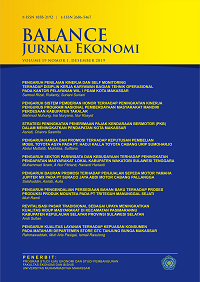Analysis of the Implementation of the Syirkah Contract on Nia Fiqih Muamalah Cake from the Perspective of Gowa Regency, South Sulawesi Province
DOI: https://doi.org/10.26618/jeb.v20i2.13973
Shirkah Agreement, Business, Profit Sharing, Fiqh Muamalah
Abstract
The research investigates the implementation of the syirkah contract at Nia Cake in Gowa Regency, South Sulawesi, focusing on its mechanisms, obstacles, and perspectives from muamalah fiqh. Using a qualitative descriptive approach, data was collected through observations, interviews with managers and capital providers, and documentation from Islamic economics experts. Primary data stemmed from field research, while secondary data supported the findings. The study reveals that the syirkah contract begins with both oral and written agreements. The manager educates capital owners about the contract, agreeing on a 50% profit-sharing model, with losses shared equally. All terms are documented in a formal investment agreement. Trust is emphasized as a core principle among partners. From the muamalah fiqh perspective, two types of contracts are utilized: syirkah mudharabah and syirkah inan, both compliant with sharia law. However, challenges persist in educating potential non-Muslim investors about syirkah concepts and finding suitable capital providers. Additionally, the absence of a halal certificate for products complicates matters. The implications of this research suggest that it enhances understanding of syirkah mechanisms within small and medium enterprises (SMEs) and offers practical recommendations for businesses to adopt syirkah contracts to improve access to capital and foster economic growth while raising awareness of Islamic economic principles.References
Fauzia, I. Y., & Riyadi, A. K. (2018). Prinsip Dasar Ekonomi Islam Perspektif Maqasid Al-Syariah. Jakarta: Kencana.
Fitri, V. N., Bayuni, E. M., Maulida, I. S. R. (2021). Analisis Implementasi Akad Syirkah Mudharabah Pada Franchise Kebab Turki Baba Rafi Buah Batu Menurut Fiqh Muamalah. Prosiding Hukum Ekonomi Syariah, 7(2). http://dx.doi.org/10.29313/syariah.v0 0.31335
Mufidah, Z. A., & Kurniawan, R. R. (2020). Syirkah dalam Bisnis Islam. Jurnal Ilmu Al-Qur’an dan Tafsir, X(X).
Muslich, A. W. (2017). Fiqih Muamalat. Jakarta: Amzah.
Noor, S. M. (2019). Hadits Tentang Syirkah dan Mudharabah. Jakarta Selatan: Rumah Fiqih Publishing.
Nurhadi. (2022). Maqashid Of Sharia Cooperation. Jurnal Anwarul, 2(3).
Pratiwi, S. A. S., & Fauza, N. (2022). Konsep Syirkah Menurut Perspektif Mazhab Syafi’iyah. Al-Muraqabah: Journal of Management and Sharia Business, 2(2).
Qori, E. D. (2020). Analisis Implementasi Akad Syirkah Pada Praktik Kerjasama Bagi Hasil Usaha Budidaya Udang Vaname. MIYAH: Jurnal Studi Islam, 16(01).
Republik Indonesia. (2017). Fatwa Dewan Syariah Nasional- Majelis Ulama Indonesia. Fatwa No: 114/DSN-MUI/IX/2017 Tentang Akad Syirkah.
Sari, D. M. S., Suartini, S., Mubarokah, I., & Hasanuh, N. (2021). Pengaruh Pembiayaan Mudharabah, Musyarakah Dan Murabahah Terhadap Profitabilitas Bank Umum Syariah. Jurnal Ilmiah Ekonomi Islam, 7(01), 241-249.
Saripudin, U. (2018). Aplikasi Akad Syirkah Dalam Lembaga Keuangan Syariah. Jurnal Al-Amwal, 1(1).
Setiawan, D. (2013). Kerja Sama (Syirkah) dalam Ekonomi Islam. Jurnal Ekonomi, 21(3).
Siti, F. (2022). Syirkah Dalam Bisnis Syariah. Jurnal Muawadah: Jurnal Hukum Ekonomi Syariah, 1(1).
Sudarto, A., Mustofa, M. B., & Mu’in, F. (2022). Aqad Syirkah: Dalam Kompilasi Hukum Ekonomi Syariah Dan Mazhab Maliki. ASAS: Jurnal Hukum Ekonomi Syariah, 14(01).
Sugesti, D. (2019). Mengulas Tolong Menolong Dalam Perspektif Islam. Jurnal PPKn & Hukum: Pelita Bangsa Pelestari Pancasila, 14(2).
Suryani. (2012). The Significance Of Islamic Economics Study In Discipline Of Modern Economics. Journal Of Indonesian Economy And Business, 27(1).













